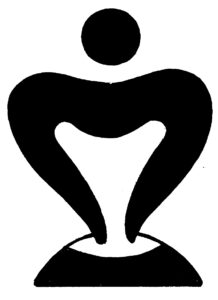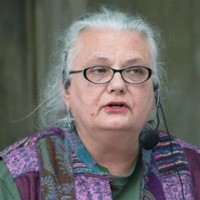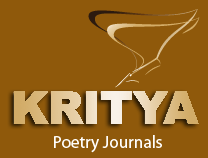
In The Name of Poetry
Mother Poems by Christina Pacosz

A Woman About to Give Birth Aboard Ship Speaks to Her Condition
June 12, 1750 Somewhere upon the Atlantic
In the extremes of my travail, I cried out,
and who would not, for doesn’in the Good Book
command strict counsel, With pain
you will give birth, but woe unto me,
with such wrenchings and twistings
as I never did see, I could not.
The babe chose to tarry while a storm roared
without. I feared the child had been begotten
in an evil hour, so oppressed was I
within the stifling hold, staring at my belly heaving
as the ship tossed and heaved upon the sea
and I gnashed my teeth and flailed about in misery.
My shipmates, weary of my incessant sobs and wails,
and thinking to placate what Powers raged,
cast me out upon the bosom of the sea.
Yes, good folk, it was my sorry lot
not to give birth as I had so fervently
beseeched Heaven, but to be born again,
myself in those cruel waters. Strong men
thrust aside the women who attended me
and roughly grabbed me up, bloody clothes and all,
pitching me like a penny through the open porthole.
I felt kin to a bird or some strange flying fish
for those sweet, brief moments I hovered
above the waves, gulping salt air
like a starving wretch. That tangy stuff
was my last sup, and then I was in the sea and of it,
just as my babe was encompassed in me, floating
in its own briny deep. So came my time and gravid
was I in those cold and indifferent waters, closing
about my head. Now my screams went unheeded,
naught to offend but the little fishies,
who waited upon me to be dead. I commended
my soul to the great God above, for Heaven
must be my lot, not Hell, how else to explain
such an ignominious fate. I could not.
(*Based upon an actual diary account of the incident, A People’s History of the United States, Howard Zinn.)
“A Woman About to Give Birth Speaks to Her Condition,” Exquisite Corpse, Fall, 1992.
The Ocean Roaring
for Sophia
The waves roll in from Japan
the unattainable shore.
Women without a country
we sit on a log
from God knows where.
My bridge
from the nine month dark
to this harsh light
stares at the sea,
the mythic horizon.
I offer her the temporary
refuge of my arms
but I cannot staunch her wounds.
Did she feel this helpless
when I was an infant in her lap?
Forty years of our bloody
bread cast now upon
the blue Pacific
waits for the tide
to turn.
Intimations
1.
My mother trimmed pie pastry with a pair of household scissors and used a lot of cinnamon. When she made lemon meringue pie, I missed the cinnamon.
The night sky in that city shut out natural light, blossomed orange and flared red as the men on the late shift moved with the pour, backs to the freezing river, faces blasted from the heat.
On Friday nights I would go to the Roller Drome and stare past the stale cigarette air, into the dark edges of the lit rink, at girls and boys. Kissing.
I walked by the Rouge River, the sluggish current concealing bald tires, used condoms, and the bodies of young girls.
I liked my mother’s apple pie best.
Across the street from the river was a home for wayward girls. Brick buildings, acres and acres of grounds where nothing ever moved. When I went past the gates, I felt dirty, everything was dirty, like the priest saying sex behind the black screen of the confessional.
The cops dragged the Rouge in any season, but winter was a messy business, busting the ice with heavy iron hooks. My mother spoke in whispers and hid the newspaper. She stopped making pies.
We’d go to funeral parlors, picking our way across knife icy streets to Turowski’s, or across town by bus to Pinkos and Szwapa, to stare at dead babies, embalmed cherubs in lace trimmed white satin. Or old men with pancaked faces, veined hands grip¬ping cheap rosaries, age spots visible in spite of the powder.
And the bodies of young girls retrieved from the Rouge, breasts secretly ripening like strawberries beneath the bodices of their Holy Communion gowns.
2.
I was afraid I would end up just another discarded girl bloated beyond the undertaker’s art, lying on padded sateen, a fake pearl rosary threaded through sausage fingers, my glasses lost forever in the muck. Would the boys kiss me now?
My nipples were darker than cinnamon.
My mother would never make pies again.
Published “Intimations,” Bellingham Review. (Not sure of date. Early 1980’s. Copy destroyed by fire.)
Copper Basin Hospital, Copper Hill, Tennessee
“Ahead of us the road led
through a land of desolation,
through a man made desert,
through a hundred square miles
of poisoned earth.”
Edwin Way Teale
North with the Spring
The hospital sits on a rise,
surrounded by miles of gullies,
sprawling washes, classic
textbook erosion. The earth
is red and retrieving itself
by inches.
Here, a small pine,
a scraggly sapling there
and kudzu flowing,
an insistent green river,
balm for gouged flesh.
She is dying.
Her tongue black
with charcoal flies
from her mouth.
Tubing dictates
what life remains.
A few miles down the highway
men still dig copper,
father sons who plan to,
and daughters who’ll call
this red dirt home.
Thunderheads claim
the heavens. Wind
silvers the red maple.
I step outside.
The first drops hit me like fists
and I remember
you, mother,
bent over a coleus,
your face like a small sun.
Bright foliage beckons
from carefully tended park beds.
You kneel, quick, furtive,
a cutting in your purse
and out of sight before
I know what’s happened.
I follow you to the restroom
where you soak your handkerchief
in tap water and tenderly
wrap the leaf.
Mimosa blooms
in sudden puddles.
Why is it I can’t recall
coleus in your kitchen,
luxuriant, tropic, preening
in the factory blasted light?
“Copper Basin Hospital,” Sing Heavenly Muse!, Issue 19, Fall, 1991.
Ghosts and Gnosis
“She knew the world was a stallion
rolling in the blue pasture of ether.
She knew that God tore down the old
world every evening and built a new one
by sun up.”
Zora Neale Hurston, Their Eyes
Were Watching God
Some green thing did root,
for here we are,
mother and daughter,
walking the hills this hot afternoon,
exploring the back roads
of our confused love.
Like animals
in the uneasy hours
before an earthquake,
we sense tremors and seek
escape, unable to bear
the silence pressing down
on us before the earth
splits open.
Away from the trailer and its air
thick with defeat, I am like a prisoner
too long behind locked doors.
Out here corn grows twelve feet
under a tall sky.
She doesn’t sense, can’t smell
what she moves through
and resents my joy, the small pleasures
under blue sky:
Hummingbirds drilling the stillness
and the clay beneath our feet.
A half mile and we come to gravel,
green trees and fern, cooler air
with a scent of water.
Mamie’s cabin is to our left,
timbers rotting in the damp.
I shout, “Hey!” to an empty clearing,
determined to show the stranger
at my side the proper way
to greet a ghost.
An oriole flashes orange in the glade.
I step through the front door,
joke about iced tea, fresh lemonade.
I sniff for remnants of a human welcome.
Little lingers. The cabin is full of
the usual rubble, crumbled mortar,
bricks hugging corners,
last year’s oak leaves,
raspy underfoot.
I wish we could arrive,
sip drinks cooled with ice
chipped from huge blocks.
We would share easy conversation,
watch dusk move through the trees
and fireflies clarify what is
luminous from the liquid night.
“Ghost and Gnosis,” Seattle Arts Commission award winner, 1984.
Blueberry Day
A day with more commitment
to fall than summer,
but hot with a blue sky.
We are wearing
bathing suits
and careful shoes
climbing the red dirt
and sharp rocks
while the dogs range
the hillside.
How is it we have taken
a lifetime to pick blueberries
wild in the wood and plentiful?
You will make a pie, you say,
and I laugh because
the day shields us
with a blue cloak.
Your arms and legs
are skinny but strong
despite a summer
in a hospital bed
flotsam of a great storm.
That is over, you say
and so stupid you’ll never
be that stupid again.
Good, I say, because
if you are, I will
force myself to forget
you, this day sweet and ripe.
The blueberries are so abundant
I keep thinking about bears
though I say nothing
to summon what has separated us
more than distance
but offer you my arm.
We forage for berries
grazing on their blue
forgiveness.
“Blueberry Day,” honorable mention Moving Out, December, 1989.
Discovering Judas
I am trapped by dawn
and the empty bed
where she so recently
rested My brother’s
voice a dark repetition:
Mama’s dead, Mama’s dead.
My father lies in bed
alone in the room
that is his now
and I rise
at my brother’s cry
a sleepwalker.
The hearse is black
of course The first
I’ve ever summoned.
Carrying careful men
who ask questions
but never the right one.
Did you love her?
Her body rests
on a gurney and denials
pile up A rock slide
at timberline where
the wind is always
howling
I kiss her forehead
and listen to the oxygen
roaring in her lungs My lips
are dry and cold
like her flesh
like the mountain
where the trees stop
and rock begins
Dry and cold as Judas’ lips
when he brushed them against
Jesus’ cheek?
The hearse spins its tires
in the red mud and rain
I cannot imagine
it trapped in the dirt
with her inside
broken and done.
Sophia Visits the Horse Islands
The perfection of horses.
Free, roaming
the salt marsh, the beach,
swimming the surf.
How their hooves
rustle sea oats
or thud on the sand.
She has no desire
to ride them, remembering
a lifetime of being ridden.
Dreams instead
of stroking rough flanks
with rough hands,
moving with the herd,
another mammal.
One night she sleeps
under the oaks, surrounded
by the moon and a great
breathing, protected
by an equine strength.
When the herd swims the channel,
heads high out of water,
Sophia swims with them,
a buoyancy
floating to shore.
“Sophia Visits the Horse Islands,” honorable mention TheDevil’s Millhopper, Spring, 1988; also
Outer Banks Magazine, 1992 1993.

Writing since she was in high school in Detroit She has more ten books of poetry: not all remain in print. her one chapbook How to Measure the Darkness, Seven Kitchens, 2012 is available in a very limited edition. Her publications and journals are at the University of Michigan Bentley Historical Collection. She has worked as an editor for kritya, a poetry magazine, edited by Dr. Rati Saxena and also with Dr. John Guzlowski for two issues of kritya focusing on poetry of Polonia. 2019 Seven Kitchens published her chapbook In the Outlaw’s House.

